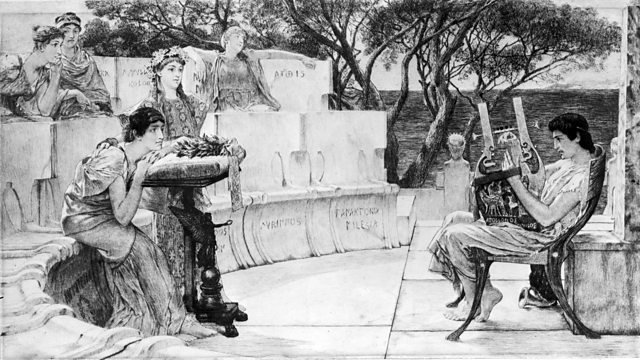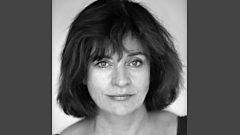
Women in Love
Texts and music inspired by the love between women, with readings by Diana Quick and Sophie Ward. Including Sappho and Woolf, plus Hildegard of Bingen, Delibes and Debussy.
Diana Quick and Sophie Ward read a selection of poems inspired by the love between women over the ages - from the great Sappho whose many poems exist in tiny fragments, to Virginia Woolf in comic vein and the aunt and niece partnership who travelled Europe writing exquisite poems under the nom de plume Michael Field. Includes music by Hildegard of Bingen, Delibes and Debussy.
Broadcast as part of the ������̳'s Gay Britannia season.
Last on
More episodes
Previous
Music Played
Timings (where shown) are from the start of the programme in hours and minutes
-
![]() 00:00
00:00Linda Montano
Portrait of Sappho
Performer: Linda Montano (voice & electronics & piano).- CRI CD 780.
- Tr3.
-
Sappho (translated by Michael R Burch)
Fragment 50, read by Diana Quick
Sappho (translated by Michael R Burch)
Fragment 42, read by Sophie Ward
Sappho (translated by Michael R Burch)
Fragment 58, read by Diana Quick
Sappho (translated by Michael R Burch)
Fragment 155, read by Sophie Ward
Sappho (translated by Michael R Burch)
Fragment 4, read by Diana Quick
Sappho (translated by Michael R Burch)
Fragment 156, read by Sophie Ward
Sappho (translated by Michael R Burch)
Fragment 14, read by Diana Quick
Sappho (translated by Michael R Burch)
Fragment 113, read by Sophie Ward
Sappho (translated by Michael R Burch)
Fragment 12, read by Diana Quick
Sappho (translated by Michael R Burch)
Fragment 36, read by Sophie Ward
Sappho (translated by Michael R Burch)
Fragment 94, read by Diana Quick
Sappho (translated by Michael R Burch)
Fragment 52, read by Sophie Ward
Sappho (translated by Michael R Burch)
Fragment 29, read by Diana Quick
Sappho (translated by Michael R Burch)
Fragment 79, read by Sophie Ward
Sappho (translated by Michael R Burch)
Fragment 93, read by Diana Quick
![]() 00:07
00:07Hildegard von Bingen
O nos peregrine sumus from Ordo Virtutum
Performer: Sequentia.- DHM 77394 2.
- Tr3.
Amy Lowell
Aubade, read by Sophie Ward
Amy Lowell
Interlude, read by Diana Quick
![]() 00:11
00:11Aaron Copland
Piano Sonata, 2nd movement
Performer: Peter Lawson.- EMI 2 34465 2.
- Tr2.
Emily Dickinson
Her breast is fit for pearls, read by Diana Quick
![]() 00:15
00:15John Adams
Put your loving arms around me from Gnarly Buttons (extract)
Performer: André Trouttet (clarinet), Ensemble InterContemporain.- EMI 9 67133 2.
- Tr7.
Emily Dickinson
Its a sorrowful morning Susie, read by Sophie Ward
![]() 00:19
00:19Aaron Copland
Fanfare for a common man
Performer: Mexico City Philharmonic orchestra, Enrique Batiz.- Angel CDM7643062.
- Tr1.
Virginia Woolf
Orlando (extract), read by Sophie Ward
![]() 00:25
00:25Spoliansky
Maskulinum-Femininum
Performer: Ute Lemper (soprano), Jeff Cohen (piano).- Decca 452 601-2.
- Tr14.
Henry James
The Bostonians (extract), read by Diana Quick
![]() 00:30
00:30Pauline Oliveros
Poem of Change (extract)
Performer: Pauline Oliveros (voice & accordion).- CDR CD 780.
- Tr1.
![]() 00:31
00:31Ethel Smyth
Elegy from Concerto for violin, horn & orchestra (extract)
Performer: Sophie Langdon (violin), Richard Watkins (horn), ������̳ Philharmonic, Odaline de la Martinez (conductor).- Chandos 9449.
- Tr6.
John Donne
Sappho to Philaenis, read by Sophie Ward
![]() 00:41
00:41Léo Delibes
Dome épais from Lakme
Performer: Mady Mesplé (soprano), Danielle Millet (mezzo), Orchestra of the Opéra comique, Alain Lombard (conductor).- EMI 7494320 2.
- CD1 Tr 5.
Katherine Fowler Philips
To my excellent Lucasia, on our friendship, read by Sophie Ward
![]() 00:46
00:46k.d.lang & Ben Mink
Miss Chatelaine
Performer: k.d. lang.- Nonesuch 7559-79798-9.
- CD1 Tr9.
Swineburne
Anactoria (extract), read by Diana Quick
![]() 00:51
00:51Pauline Oliveros
Poem of Change (extract)
Performer: Pauline Oliveros (voice & accordion).- CDR CD 780.
- Tr1.
Pope
Sappho to Phaon (extract), read by Diana Quick
![]() 00:56
00:56Alexander Glazunov
La Mer (extract)
Performer: Royal Scottish National Orchestra, Jose Serebrier (conductor).- Warner Classics 2564 66467-2.
- CD5, Tr5.
Sappho (translated by Paul Roche)
Come back to me, Gongyla, read by Diana Quick
Michael Field
Come Gorgo, put the rug in place, read by Diana Quick
![]() 01:00
01:00Claude Debussy
Syrinx
Performer: Juliette Hurel (flute).- Naïve V4925.
- Tr1.
Pierre Louys (translated by Alvah Bessie)
Penumbra, read by Sophie Ward
Pierre Louys (translated by Alvah Bessie)
The Complaisant Friend, read by Diana Quick
![]() 01:03
01:03Granville Bantock
Sappho (Prelude)
Performer: Royal Philharmonic Orchestra, Vernon Handley (conductor).- Hyperion CDA66899.
- Tr1.
Bliss Carman
I loved thee, Atthis, in the long ago, read by Sophie Ward
Sappho (translated by Mary Barnard)
He is more than a hero, read by Diana Quick
Bliss Carman
Like torn sea-kelp in the drift, read by Diana Quick
Sappho (translated by Jim Powell)
Fragment 6 (The Anactoria Poem), read by Sophie Ward
Sappho (translated by Mary Bernard)
I have not had one word from her, read by Diana Quick
Michael Field, read by Sophie Ward
A Girl
Producer’s Note
Poetry about love between women is a secret garden where everything shimmers ardently, tremulously, intensely. It’s secret because it stands somewhat outside the mainstream. But once you step inside, the sounds and aromas cause you to surrender to its intoxications.
There is one poet who towers above everyone else in the quality and fascination of her lyrics. Sappho, who lived on the Greek island of Lesbos around 600 BC, is one of the first poets that has come down to us who wrote from a first-person view-point about the bitter-sweet pains and joys of love. In fact it is something of a miracle that her work has survived at all. She wrote in an unusual dialect, and over the years her poems started to fall out of the chain of transmission whereby works got copied and passed down to the next generation. In fact, most of what we know of Sappho survives in snippets of her work quoted by ancient Roman grammarians illustrating arcane points of grammar and syntax.
But although the manuscript tradition broke off, some poems have turned up on bits of Egyptian papyri, such as those found in the ancient rubbish heaps of Oxyrhynchus, where a major find recovered many new fragments. These were found on strips of papyrus that had been used to wrap mummies, stuff sacred animals, and wrap coffins. The task of joining these shards together and identifying them is still being done today.
Each succeeding generation has been inspired by different facets if these fascinating gems. The Roman poet Ovid portrayed Sappho as an aging voluptuary reclaimed for heterosexuality through a supposed male lover, Phaon. This in turned was translated by Pope in the 18th Century as “Sappho to Phaon”.
But in “Sappho to Philaenis” the metaphysical poet, John Donne celebrates a passionate lesbian affair as a relationship of equality (something that was almost impossible between members of the same sex during the Renaissance.) In this powerfully wrought poem, the normally unreconstructed Donne emerges almost as a proto-feminist.
In the Victorian era the Pre-Raphaelite, Swinburne, took a perverse delight in the byways of what was considered at the time to be deviant sexuality. In "Anactoria" (supposedly one of Sappho’s lovers) he explores lesbian love as poisonous and destructive.
The French-Belgian poet, Pierre Louÿs went one step further with Songs of Bilitis – an elaborate hoax in which the sensually lesbian verses were falsely ascribed to an ancient Greek courtesan and contemporary of Sappho.
The Canadian poet Bliss Carman in his “Sappho: One Hundred Lyrics” took some of the fragments as a starting point from which to construct complete poems.
But perhaps the most extraordinary case is that of the aunt and niece combo that went under the nom de plume, Michael Field. Katharine Harris Bradley and her niece and ward Edith Emma Cooper wrote many Sappho-inspired poems together. They were lovers and co-authors for over 40 years, part of the Aesthetic Movement and strongly influenced by the thought of Walter Pater.
In the middle of the programme we take a detour from white-hot Mediterranean passion to the crisp white linen of New England – the world where the reclusive Emily Dickinson hid away, dressed permanently in white, writing cool, home-spun poems and letters to her sister-in-law, Susan Gilbert which seem to reveal hidden depths of passion beneath the surface.
A generation later, the cigar-smoking Amy Lowell – who was romantically linked to another American poet, Mercedes de Acosta - was much more the image of feisty, independent American womanhood. Very much the kind of female companion you could imagine motoring around with Henry James, who wrote possibly the funniest novel about the feminist movement – The Bostonians - set against the brooding, undeclared love between the humourless Olive Chancellor and the ardent Verena Tarrant.
In the middle comes the iconic scene from Virginia Woolf’s novel, Orlando, where the eponymous hero is transformed into the eponymous heroine – and satirically questioning the whole question of gender difference as a social construct.
***
The music I have chosen to go with these texts are there mainly because they seemed “right” for the context – with no agenda for “outing” anyone. Though both Linda Montano and Pauline Oliveros proudly appear on a CD called “Lesbian American Composers.”
Christian mystic, Benedictine abbess and composer, Hildegard of Bingen wrote highly charged letters to her younger assistant, Richardis von Stade, which might imply a romantic attachment - but that is to interpret the relationship from today’s perspective.
Delibes’ Flower duet was used as the background music for one of cinema’s most iconic Lesbian scenes in The Hunger, starring Catherine Deneuve and Susan Sarandon.
It was a pleasure to discover the music of Dame Ethyl Smyth who had a stream of passionate Lesbian affairs and was an equally passionate member of the women's suffrage movement.
PRODUCER: CLIVE PORTBURY
Broadcasts
- Sun 21 Jun 2015 17:30������̳ Radio 3
- Sun 2 Jul 2017 17:30������̳ Radio 3
Featured in...
![]()
Gay Britannia
A season marking the 50th anniversary of the partial decriminalisation of gay sex.
The hidden history of plant-based diets
Books website
Get closer to books with in-depth articles, quizzes and our picks from radio & TV.
Gallery




